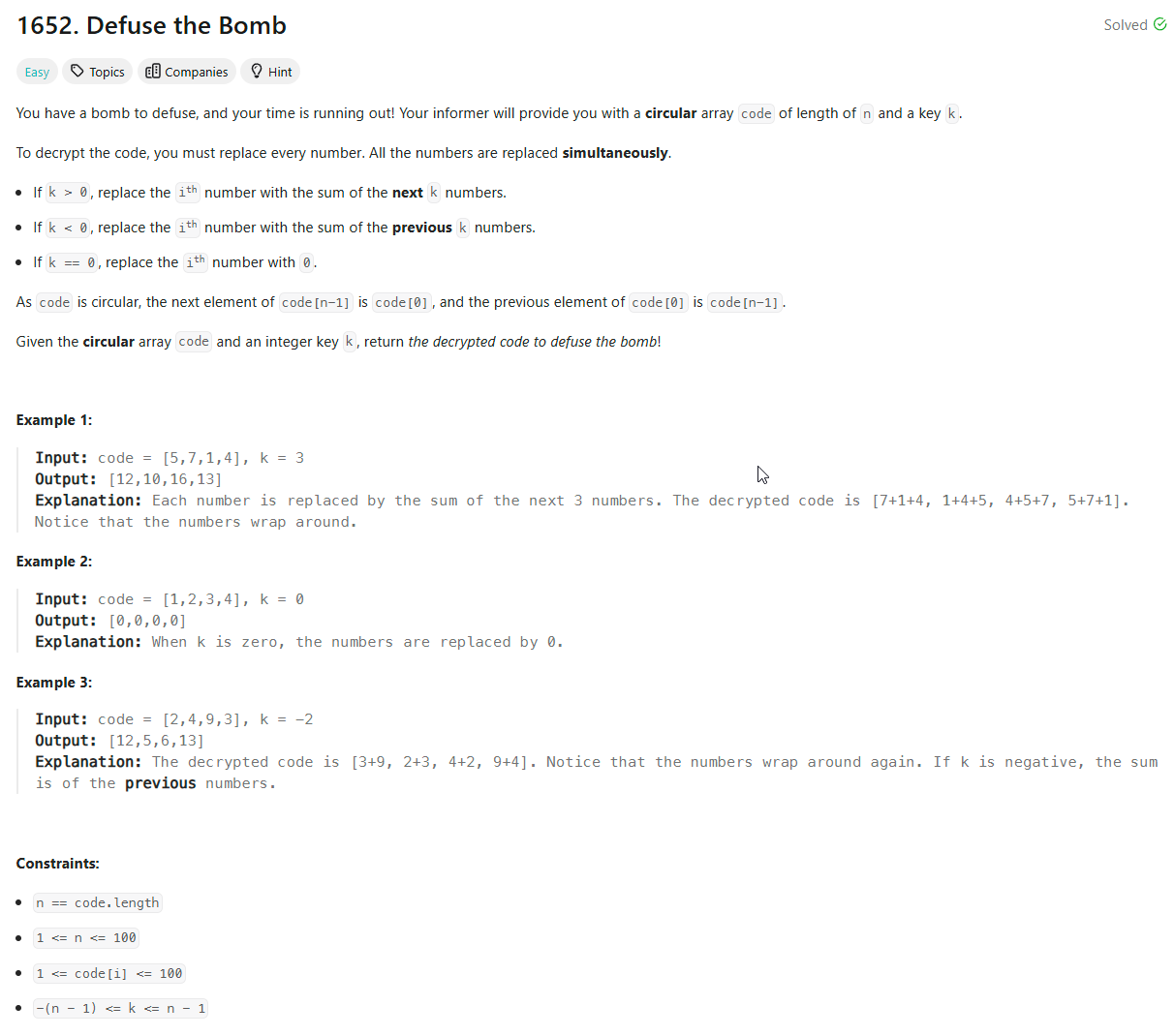Problem of The Day: Defuse the Bomb
Problem Statement

Intuition
To solve the problem of decrypting the code, the first thought is to identify the relationship between the elements in the array and how they are summed based on the given value k. If k is positive, we need to sum the next k elements in a circular manner. If k is negative, we sum the previous |k| elements, also in a circular manner. If k is zero, all values in the result should simply be 0.
Approach
-
Handle Edge Cases:
- If
k == 0, the result is straightforward — a list of zeros with the same length ascode.
- If
-
Adjust
k:- Normalize
kto always work with a positive value for simplicity. Use a flag (is_forward) to determine if we are summing forward or backward.
- Normalize
-
Circular Indexing:
- Use modular arithmetic (
%) to handle wrapping around the array indices. This ensures the sums are performed in a circular manner.
- Use modular arithmetic (
-
Iterate Through Each Element:
- For each element in the array, sum the
kelements either forward or backward depending on the value ofk.
- For each element in the array, sum the
-
Build the Result:
- Store the computed sums for each index into the result array.
Complexity
-
Time complexity:
\(O(n \cdot k)\)
We loop through each of thenelements in the list and, for each element, perform a summation overkelements. -
Space complexity:
\(O(n)\)
The result array requiresO(n)space, and no additional significant memory is used.
Code
class Solution:
def decrypt(self, code: List[int], k: int) -> List[int]:
N = len(code) # Length of the input array
if k == 0: # Special case: if k is 0, return an array of zeros
return [0] * N
is_forward = (k > 0) # Determine if we are summing forward or backward
k = abs(k) # Work with the absolute value of k
res = code[:] # Initialize the result array with the same size as the input
for i in range(N): # Iterate through each element in the input array
res[i] = 0 # Initialize the sum for the current index
for j in range(1, k + 1): # Sum the next k elements
if is_forward:
res[i] += code[(i + j) % N] # Forward summation with circular indexing
else:
res[i] += code[(i - j) % N] # Backward summation with circular indexing
return res # Return the final result array
Editorial
Brute Force
class Solution:
def decrypt(self, code: List[int], k: int) -> List[int]:
result = [0] * len(code)
if k == 0:
return result
for i in range(len(result)):
if k > 0:
for j in range(i + 1, i + k + 1):
result[i] += code[j % len(code)]
else:
for j in range(i - abs(k), i):
result[i] += code[(j + len(code)) % len(code)]
return result
- time: O(n*k)
- space: O(n)
Approach 2: Sliding Window
class Solution:
def decrypt(self, code: List[int], k: int) -> List[int]:
result = [0 for _ in range(len(code))]
if k == 0:
return result
# Define the initial window and initial sum
start, end, window_sum = 1, k, 0
# If k < 0, the starting point will be end of the array.
if k < 0:
start = len(code) - abs(k)
end = len(code) - 1
for i in range(start, end + 1):
window_sum += code[i]
# Scan through the code array as i moving to the right, update the window sum.
for i in range(len(code)):
result[i] = window_sum
window_sum -= code[start % len(code)]
window_sum += code[(end + 1) % len(code)]
start += 1
end += 1
return result
- time: O(n)
- space: O(n)